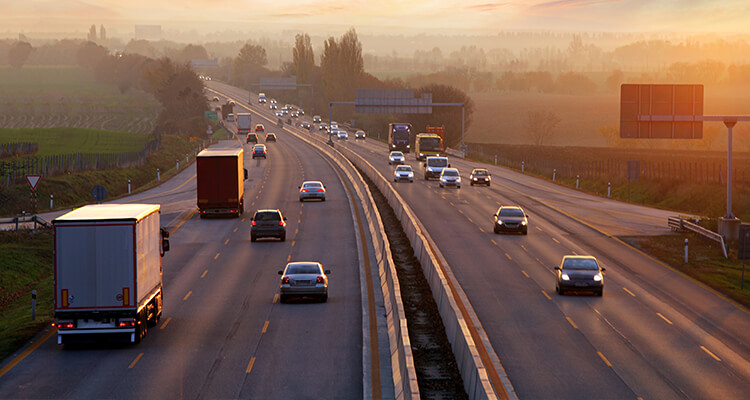It’s important to respect others sharing the road, whether cars, pedestrians, bicycles, motorbikes, taxis, buses, or trucks. Remember that everyone is just trying to get to their end destination, and your driving behaviour has a real influence on their and your safety.
Unfortunately, many car accidents on South African roads are caused by drivers not sharing the road responsibly. So, let’s look at how we can be better drivers to keep each other safe.
Top tips for sharing the road responsibly
A driver’s licence doesn’t automatically make you a good and considerate driver. Furthermore, road rage is common among South African drivers and often leads to reckless driving. Therefore, it’s important to understand that your actions on the road can directly affect yourself and those around you.
Learn how to drive safely when sharing the road using these tips.
1. Always indicate before turning or overtaking
You should always indicate well in advance before you turn or overtake other cars. Other drivers need to be aware of your next move so they can slow down and react accordingly. This is especially important for large, heavy motor vehicles like trucks. They need fair warning, as it can take a while for them to reach a standstill.
Also, not all indicators switch off automatically, so remember to turn them off manually so that you don’t confuse other drivers. While sharing the road with cyclists, look out for their hand gestures to warn you of their movement to the right or left.
2. Check your blind spots
Other drivers, cyclists and pedestrians can be easy to miss if they’re behind you. Therefore, you should adjust your mirrors before driving and always thoroughly check them and blind spots before changing lanes or turning. Remember that it’s always better to take an extra few seconds before making your move to ensure it’s safe.
Also, keep in mind that longer vehicles, like trucks, have bigger blind spots, so be careful not to drive in their blind spot for too long and only overtake when you’re sure it’s safe, and there’s no oncoming traffic.
3. Leave enough space between vehicles
Be considerate to other road users by keeping a safe following distance to give yourself enough time to react in unexpected situations. When approaching cyclists driving on the side of the road, don’t forget to “stay wider of the rider” by allowing for a 1.5-metre gap between your car and their bicycle, especially if there are no bike lanes.
Furthermore, larger vehicles also need more room to turn, so giving them enough space on the road is so important.
4. Don’t get distracted
One of the most important driving tips is to always stay alert on the road. Don’t get distracted by anything, and keep your eyes fixed ahead. Distractions can be a cell phone, smartwatch, loud music and even your passengers. It’s your job, as the driver, to stay alert and aware of what’s happening around you at all times.
Furthermore, looking at your phone while driving is a criminal offence in South Africa, even if you’ve stopped at a stop street or robot. Not only are you endangering your own life as well as other drivers on the road, but traffic officials could confiscate your phone, and you’ll have to pay a hefty fine to get it back.
5. Never drive when feeling tired
Driving while you’re tired is a very dangerous thing to do. Always try to rest well before a long trip, and remember to take breaks often to stretch your legs and refocus.
Falling asleep behind the wheel can cost you your life, and endanger other drivers on the road, so rather pull over and take a nap or stop at a garage for a coffee before continuing on your journey.
6. Always obey the speed limit
It’s tempting to ignore the speed limit when you’re in a rush, but this is so dangerous and inconsiderate. Speed limits exist for a reason, often taking into account that there are schools in the area where kids cross the road, for example. If you ignore these speed limits, you could put yourself and others in grave danger.
Always be mindful when approaching bikes or pedestrians on the side of the road, and slow down when you’re near.
7. Don’t drink and drive
We all know this road rule. Driving while under the influence is one of the biggest threats to safety on South African roads. Alcohol and drugs affect the nervous system in the body and alter brain function, which influences decision-making, behaviour, mood, and consciousness, making intoxicated drivers a real risk on the road.
So, don’t put yourself or others in danger by drinking and driving. Instead, choose a designated driver who doesn’t drink any alcohol or use a taxi service to ensure everyone arrives safely.
8. Be prepared
Accidents still happen even when you follow all the rules and share the road responsibly. That’s why it’s best to be prepared before getting behind the wheel with car insurance you can rely on.
Get car insurance you can trust
Join our Prime Family today, and rest assured that you’re backed by the best, even in the worst-case scenarios. We believe all South African drivers deserve the peace of mind that comes with having quality insurance. Fill in this quick form now, and we’ll be in touch with a personalised quote for your cover.
Disclaimer
This article provides general information about road safety and sharing the South African road with others. Always follow the South African law and rules of the road to ensure your safety, as well as the safety of your fellow commuters.
Buying car insurance should be done with much thought and only from a certified financial services provider. Contact us today to learn more about getting affordable, comprehensive car insurance with fixed premiums* and a reduce-to-zero excess*. *T&Cs apply.








